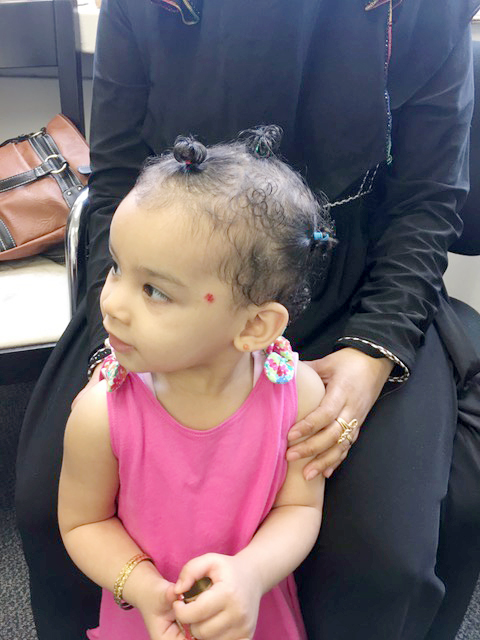By Eli Newman – The Yemeni American News
Growing up in the Yemeni city of Taiz, Maren Al Shaibani’s knew that one day she would make it to the United States. “This was my dream when I was young, Maren says. “I’d dream about the day I’d come to America. I thought I would live like a queen.”

It was a dream she’d share with her husband, Ibrahim Senan. The two were wed in Saudi Arabia where Ibrahim worked as an accountant. It was also where the two would raise their daughter Layan through infancy. After living in Saudi Arabia for two years, Ibrahim was laid-off and their plans to come to the United States were put in motion. “We went to the [American] embassy in Saudi Arabia and we applied for a tourist visa,” Maren says.
The family planned to meet with mutual friends in Detroit whom they had met through Facebook. Gearing up for their flight, Maren and Ibrahim brought a lot of luggage for their new lives in America, including a suitcase full of gifts for their welcoming friends and a few others full of all sorts of clothing. “It was winter time and jackets are so expensive so we had to be ready,” Maren explains.
But it was Maren’s preparation that led them down a path of extreme duress.
After landing in Detroit last November and approaching United States Citizenship and Immigration Services, Maren says a security officer noticed they were carrying a suspicious amount of luggage and the family was detained. It wasn’t long until they told USCIS the truth; when the border agents told the family they would be deported to Saudi Arabia, Ibrahim said he wanted to declare political asylum.
USCIS would not comment on the specific nature of Maren, Ibrahim and Layan’s detention, but Ibrahim’s declaration didn’t grant him access to the U.S. Though filing for asylum is possible at ports of entry, border agents have the ability to find applicants inadmissible and subject to deportation. “It is the law that providing certain information to obtain a visa based on [misrepresentation], you’re subject to review and assessment,” says Imad Hamad, Executive Director of American Human Rights Council, a group that’s aided Maren since exiting custody. “Mr. Senan claimed asylum on the spot, he was taken into custody and his file became one case, and his wife and the baby became another case.”
The separation of the family’s cases and their subsequent alternative handlings was a subject of strife for Maren, but her seven-month-old daughter’s health was another. “She didn’t breast feed, so usually I have a machine,” Maren explains. “I asked [the authority] if I could have the machine, but they said no.” As Maren and Layan were in custody, the two were moved from Detroit to Chicago, eventually landing at a detention facility based in Texas. “I was scared, [Layan’s] skin was turning yellow,” Maren says. Eventually, Layan recovered in Texas and the two were transported back to Detroit where they were able to get residential status as she applied for political asylum.
The same could not be said for Ibrahim.
As Ibrahim’s case was separated and Maren didn’t have any record of their marriage, his fate remained unknown. “Nobody knew where he was for ten days,” Maren says. “I hadn’t talked to him since going to Texas.” The two were eventually able to talk on the phone. Maren was able to connect with her surrogate family in Detroit, but the attorney she entrusted to take care of their family failed to establish a legal connection between the two. “When American Human Rights Council took over, we got a new lawyer. Five months later, I took my daughter and we visited him in the jail.” Ibrahim has been in various Michigan Department of Corrections facilities since November 2016 and Maren’s ability to visit him has been difficult; she needs a woman to dedicate half a day’s time for the long drives to the jail.
In the end, it’s likely Ibrahim will be deported to Saudi Arabia, an extreme burden on his family. “I can’t work there, because I don’t have legal status to go there,” Maren says. “They treat you like animals in Saudi Arabia.”
Through her adversity, Maren remains undeterred in her belief in the American dream. Though she’s unable to work given her current documentation, Maren seeks to learn English and will be able to apply for political asylum later this year. She says she’s found a community in Detroit and has set up a crowd-funding campaign to help cover expenses. “I have a dream to raise my child to be a good citizen. I know the society is not all bad, just like anywhere else, but still I feel like I can make it here,” Maren says. “The beginning was hard, just like the first step is hard, but I have hope the end will be good.”












